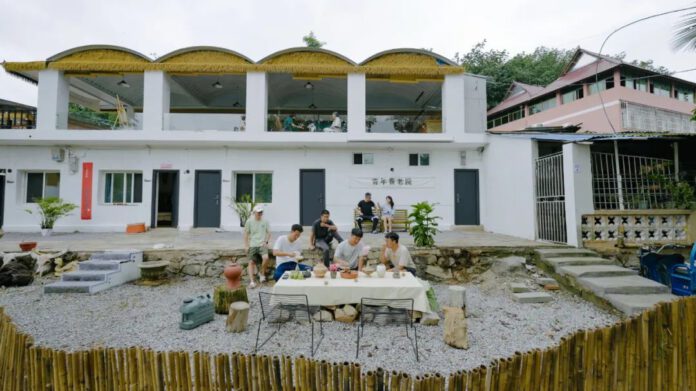
Recently, the concept of youth nursing homes has surged in popularity across various Chinese cities, including Zhengzhou, Yunnan, Chongqing, and Hefei. Businesses like cafes, bars, brunches, and farmhouses are capitalizing on this trend by branding themselves as similar services. On Chinese social media platforms, the topic has garnered over 4.4 million views, with many users sharing pictures and videos of their enjoyable experiences in these unique spaces.
What is a youth nursing home?
The concept of youth nursing homes is rapidly gaining popularity among young adults, with notable locations in the suburbs of big cities. These unique spaces offer a blend of tranquility, creativity, and community that resonates with a growing number of young people.
In Yunnan’s Mandiu Ancient Village, one such youth nursing home was originally an old, dilapidated school dormitory. The owner took a hands-on approach to renovation, transforming the building into a charming two-story structure with 12 rooms. The top floor features a sunlit study and a separate kitchen where guests can prepare their own meals, providing both comfort and autonomy.

Another example is the Wen Chao Youth Pension Home, a minimalist retreat consisting of white-walled private houses surrounding a courtyard. The interior is furnished sparingly, with only essential items like beds, tables, chairs, and cupboards. The courtyard exudes a retro vibe, complete with bonfire pits, vintage 1970s seating, and 1980s incandescent chandeliers, creating a nostalgic yet simple atmosphere.
Daily life at these youth nursing homes is a mix of relaxation and activity. Guests can engage in various outdoor pursuits such as farming, stream tracing, or hiking in the surrounding areas. Alternatively, they can enjoy quieter activities like tea-drinking, boxing, pottery-making, meditation, or simply chatting in the courtyard. Evenings often bring communal gatherings, where guests come together for impromptu concerts, singing, and piano playing.
The cost of staying at the Mandiu Ancient Village youth nursing home is relatively affordable, with off-season rates around €190 per month.
Statistics show that most visitors are in their late 20s, with the majority born in the 1990s. Two distinct groups dominate the clientele: freelance professionals such as photographers, artists, writers, and tour guides, and young people facing career challenges or seeking a break from their current work environment.
Mr Wu, a former employee of a state-owned enterprise in Beijing, shared his experience: “This place is more than just a nursing home; it’s a ‘hospital’ for my soul. I’ve become a permanent resident here. This environment allows me to rediscover myself and have endless fun. I’ve transformed from an introvert to an extrovert.”
Young people flocking to youth nursing homes
Youth nursing homes have a unique “healing” effect on young people, distinct from the care provided in traditional elderly nursing homes. The appeal lies in the psychological relaxation and “rehabilitation” they offer, which is why many young people choose to stay in these homes temporarily.
The direction of “rehabilitation” varies among different groups. For young people who struggle with socializing, these environments offer opportunities for offline interactions that can broaden their social circles and improve their social skills. Meanwhile, for those facing career or life challenges, the nursing home setting provides a space to share work-related frustrations, discuss relationship difficulties, or navigate family conflicts. The time spent here allows residents to relax, reflect, and find new directions for their lives and careers.
Some young people are drawn to youth nursing homes by the desire to reconnect with a simpler, more natural lifestyle, often found in rural settings. Additionally, with the approach of an aging society, some young adults are proactively exploring retirement options, using their stay as an opportunity to envision their future.
An Feng, a sociologist at Luoyang Normal University, notes, “Young people are eager to engage in and experience the simple and joyful life of the elderly. This represents a cross-generational life experience. In a fast-paced society with high work pressures, young people seek out youth nursing homes as a form of active self-regulation, a way to relieve stress and return to a better state.”
While youth nursing homes have a significant “healing” effect, they are not designed for old age. They do not offer long-term living arrangements, nursing care, or medical services, and thus differ from traditional nursing homes. Their core function remains centered on psychological comfort and emotional well-being.
How Youth Nursing Homes Can Thrive
The evolution of youth nursing homes could take several directions, each enhancing their value and impact.
Firstly, an online social platform could be developed, allowing residents to maintain connections and interact beyond their physical stay. This platform could also facilitate collaboration between youth nursing homes across different regions, creating a broader network for communication and exchange.
Secondly, for current or prospective managers of youth nursing homes, there is potential to enrich the experience by incorporating local ethnic or folk cultures into the services offered. This could involve workshops on traditional crafts or performances of local theater and music, tailored to the unique cultural heritage of the area.
Additionally, youth nursing homes could explore partnerships with elderly nursing homes. For instance, in Jinyun County, Zhejiang Province, the Civil Affairs Bureau has introduced an “intergenerational cohabitation” program, where young people live alongside the elderly, engaging in activities such as reading, playing chess, or teaching them how to use smartphones. In return, young participants receive rent reductions. This model could be expanded, allowing young residents to volunteer in elderly homes, offering companionship and support, while also gaining a sense of fulfillment and purpose.
Integrating youth and elderly nursing homes in this way would create opportunities for meaningful interactions. Young people could find relaxation and purpose through volunteer work, while elderly residents benefit from the companionship and energy of younger generations.
From a business perspective, youth nursing homes have the potential to complement existing venues like B&Bs and cafes, offering a richer and more diverse experience. They provide not just a place to stay, but also psychological comfort and social engagement, offering advantages over traditional leisure tourism or casual gatherings in terms of mental and emotional well-being.
Source: the Paper, edigest, 36kr



